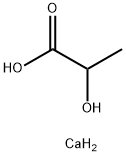Calciumlactate , 98% , 814-80-2
Synonym(s):
Calcium lactate
CAS NO.:814-80-2
Empirical Formula: C3H8CaO3
Molecular Weight: 132.17
MDL number: MFCD00150986
EINECS: 212-406-7
| Pack Size | Price | Stock | Quantity |
| 5g | RMB25.60 | In Stock |
|
| 25g | RMB69.60 | In Stock |
|
| 100g | RMB173.60 | In Stock |
|
| 500g | RMB454.40 | In Stock |
|
| 2.5kg | RMB1919.20 | In Stock |
|
| others | Enquire |
PRODUCT Properties
| solubility | Soluble in water, freely soluble in boiling water, very slightly soluble in ethanol (96 per cent). |
| PH | 7.56(1 mM solution);7.97(10 mM solution);8.28(100 mM solution);8.5(1000 mM solution) |
| Odor | Odorless |
| Major Application | pharmaceutical (small molecule) |
| Cosmetics Ingredients Functions | KERATOLYTIC ASTRINGENT BUFFERING |
| Cosmetic Ingredient Review (CIR) | Calcium lactate (814-80-2) |
| InChI | InChI=1S/C3H6O3.Ca.2H/c1-2(4)3(5)6;;;/h2,4H,1H3,(H,5,6);;; |
| InChIKey | KSDPLTNUUQNXLV-UHFFFAOYSA-N |
| SMILES | C(O)(C)C(=O)O.[Ca] |
| LogP | -0.698 (est) |
| CAS DataBase Reference | 814-80-2(CAS DataBase Reference) |
| EPA Substance Registry System | Calcium lactate (814-80-2) |
Description and Uses
Calcium lactate is a black or white crystalline salt made by the action of lactic acid on calcium carbonate. It is used in foods (as an ingredient in baking powder) and given medicinally. Its E number is E327. It is created by the reaction of lactic acid with calcium carbonate or calcium hydroxide.
Calcium lactate is often found in aged cheeses. Small crystals of it precipitate out when lactic acid is converted into a less soluble form by the bacteria active during the ripening process.
In medicine, calcium lactate is most commonly used as an antacid and also to treat calcium deficiencies. Calcium lactate can be absorbed at various pHs and does not need to be taken with food for absorption for these reasons.
Calcium lactate is added to sugar-free foods to prevent tooth decay. When added to chewing gum containing xylitol, it increases the remineralization of tooth enamel.It is also added to fresh-cut fruits such as cantaloupes to keep them firm and extend their shelf life, without the bitter taste caused by calcium chloride, which can also be used for this purpose.
Calcium Lactate is the calcium salt of lactic acid which is soluble in water. it has a solubility of 3.4 g/100 g of water at 20°c and is very soluble in hot water. it is available as a monohydrate, trihydrate, and pentahydrate. the trihydrate and pentahydrate have solubili- ties of 9 g in 100 ml of water at 25°c. it contains approximately 14% calcium. it is used to stabilize and improve the texture of canned fruits and vegetables by converting the labile pectin to the less solu- ble calcium pectate. it thereby prevents structural collapse during cooking. it is used in angel food cake, whipped toppings, and meringues to increase protein extensibility which results in an increase of foam volume. it is also used in calcium fortified foods such as infant foods and is used to improve the properties of dry milk powder.
Safety
| Symbol(GHS) |  GHS07 |
| Signal word | Warning |
| Hazard statements | H315-H319-H335 |
| Precautionary statements | P264-P280-P302+P352-P321-P332+P313-P362-P264-P280-P305+P351+P338-P337+P313P |
| Risk Statements | 36/37/38 |
| Safety Statements | 26-36/37/39 |
| WGK Germany | WGK 1 |
| TSCA | TSCA listed |
| Storage Class | 11 - Combustible Solids |
| Hazardous Substances Data | 814-80-2(Hazardous Substances Data) |


